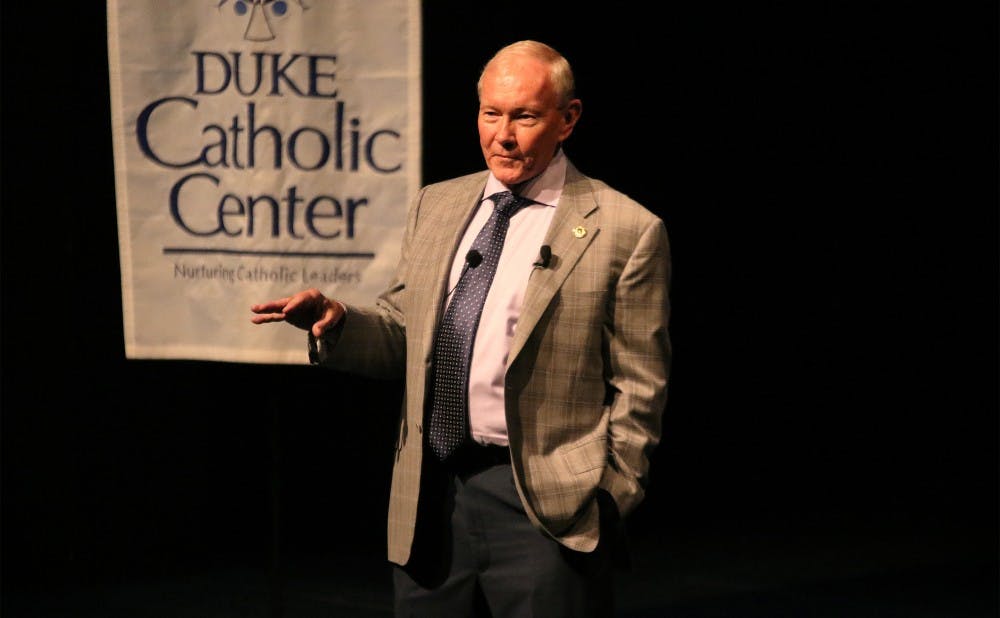Martin Dempsey, retired United States army general and 18th Chairman of the Joint Chiefs of Staff, spoke about his experiences in the military Thursday evening.
The talk, sponsored by the Duke Catholic Center, was titled "Faith in Geopolitics: A Personal Experience." Dempsey told stories about his time as a young man in the military and as a division commander in Baghdad. He said his Catholicism was important in defining his moral values as a leader in the military.
“You know that thing about ‘there’s no atheist in a foxhole?’ It’s true,” Dempsey said. “There was none of this, ‘oh my gosh you shouldn’t be praying in your uniform, let’s keep separation of church and state’—you go into something like Baghdad, you’re going to say a prayer before, during and after.”
Dempsey remembered attending the funerals of soldiers under his command who died in Baghdad, and said he struggled to think of the right thing to say to their surviving peers.
“I needed to walk down the line and say, ‘make it matter that this young man or young woman just lost their lives,'” Dempsey said. “Make it matter."
He compared morality to the dilemmas of 1920s wing-walkers, who would entertain audiences by walking on the wings of small airplanes, and then advised his audience to follow their faith.
“Make sure that the hand you keep as your steadying hand and [the hand that] keeps you from flying off the face of the Earth, is your faith,” Dempsey said. “You’ve got that, and that little voice in your head that says ‘we can do that, and we can probably get away with it, but we shouldn’t do it.’ I’ve ignored that voice on occasion—I have to say this because my wife is in the audience—and in every case I’ve regretted ignoring it."
This is not the first time Dempsey visited campus: he received a master’s degree in English from Duke in 1984, and spoke at the commencement in 2014. Last October, he was named a 2016 Rubenstein Fellow.
In a question and answer session following the speech, Dempsey explained how he managed the possible conflict between his faith and the military and government's emphasis on secularity.
“It’s not written any place that tells people they can’t express their faith, but there’s a whole group of people that watch for that, separation of church and state. So in the military we talk more about ethical issues than maintaining your faith,” Dempsey said. “In government we suffer the same constraint—don’t openly discuss your faith, but it’s gotta be in your heart, and I understand that. As soon as you give someone the opportunity to be critical of you for your faith, they will be.”
Some members of the audience asked about the changing face of the American military and possible threats abroad.
“Now we’re in a period where we have state actors, terrorist groups, and we also have sub-state actors like ISIS, who are terrorist groups but aspire to have government, establish systems and goods and services for a certain subset of the people. It’s very complicated,” Dempsey said. “What it takes in that environment is careful thought about what we’re trying to accomplish as a country and who we are as a country."
Junior Nick Sieja who attended the lecture said that Dempsey’s advice was practical for him in his future career.
“When I graduate I’m going to commission into the Navy, so this was a very helpful thing for me,” Sieja said. “Sometimes I struggle with the fine line between extreme faith and the violence that comes with a wartime environment, so listening to him talk about moral and ethical issues was really good for me as a student who’s anticipating that kind of environment.”
Dempsey stressed to the largely Catholic audience that organized religion is an important way to develop a moral compass.
“In the formative years—which, by the way, is baptism to 50—I think that organized religion is important to give a sense of belonging. But that doesn't mean I’m telling any of the older folks in the audience to quit going to church!”
Get The Chronicle straight to your inbox
Signup for our weekly newsletter. Cancel at any time.

